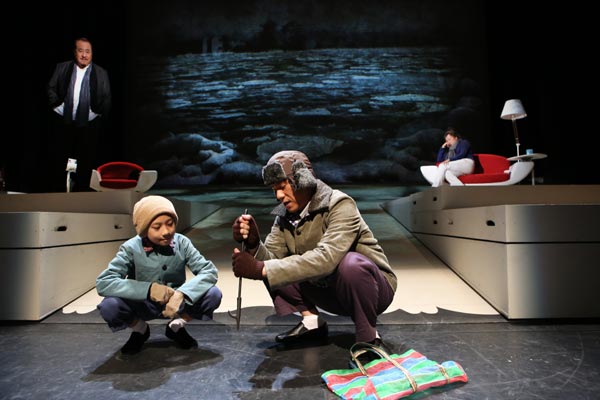

Tian Haojiang, the Beijing-born and New York-based opera star, developed his keen interest in drama through the Taiwan classic The Village, which resonates with his complicated feelings as a traveler away from home. The nostalgic play tells a decades-long history of three Kuomintang soldier families who are exposed to the vicissitudes of life in a constantly complex discussion about going home to the Chinese mainland.
Before Tian and Wang Wei-chung, theater producer and Taiwan's TV tycoon, explored the possibility of staging a drama, both men knew nothing could be more riveting and revealing than stories of their own lives.
Although the two middle-aged men grew up under different education systems across the Straits, they discover that their lives were more similar than they thought. They're both from military families; they had both "eavesdropped" on radio channels from the other side of the Straits; they both had an older brother with whom they had a complicated relationship.
However, their parallel lives are also different in many ways-such is a reflection of the distinct changes within each society.
With some courage, Wang and Tian decided to showcase their own lives onstage. After writing for two years, they are now ready to present a semi-biographical play, Only A Recollection of the Past.
In the play, the two first-time actors switch among identities, such as their fathers, military officers and themselves, narrating or acting out their first dates, moments of departure and other inspiring, moving and thought-provoking snapshots from their lives.
The name of the drama is borrowed from a popular old Chinese song. It was the first song that Tian "eavesdropped" on a Taiwan radio channel, also the first subject that brought the two men together.
When Tian was a child, he idolized his brother to such an extent that he practically copied everything his brother did. The brother also helped Tian leave the country to pursue his opera star dream in the United States.
His brother, also a fan of classical music, chose to stay at home and spent the rest of his life as a worker. It was not until his brother's last moments that Tian sadly found that his brother had an equally beautiful voice.
Wang, too, used to worship his brother as a hero who was once so powerful and taught him so many things during his childhood.
But later his brother quit school, went to the US and never returned. Wang was so angry at his brother "lazing away the rest of his life" that he never spoke to him again until after their father's death. The two had a big fight.
"I have mostly stood aloof from my brother. But after he died, I realized how much I loved him though I was once so angry at him," Wang says. "When you feel that the role of your older brother starts to change, it's actually your inner self that's changing."
Both brotherly relationships are part of the emotional climax in the play, according to director Xie Nianzu. "The two actors are using their lives instead of techniques to perform," he says.
But touching the audience is only part of their goal, Wang adds, as the more important aim is to provoke their thoughts.
"This is more like a stage of life. Many veteran artists or social workers share many learning experiences with common people. They decide to put their lives onstage so that audiences can observe the change of times and the evolution of the traditional code of conduct," Wang says.
IF YOU GO
7:30 pm, March 27-30. Poly Theater, 4 Dongzhimen Nan Dajie (Street), Dongcheng district, Beijing. 010-6500-1188.
Moods expressed through dance moves
2014-03-24Copyright ©1999-2018
Chinanews.com. All rights reserved.
Reproduction in whole or in part without permission is prohibited.